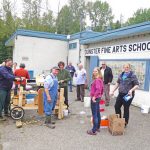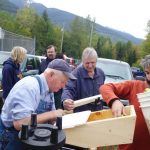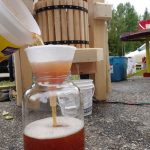Apples that would have likely rotted on the ground are turned into amazing healthy juice. The Three Valley’s Community Development Cooperative’s investment in an apple press has turned 5000 pounds of apples into juice. Pete Amyoony, a founding member of the coop, said there focus has always been on local food, and he’s glad they were finally able to bring the apple press to fruition. /YANN ASSEMAT
by Andru McCracken
They fill your fridge, coldroom and freezer. You’ve baked them, canned them, dried them, but they’re still on your lawn attracting bears and deer. You’ve given away as many as you can and you still have too many.
Apple trees can be hard. But there is finally a solution. A solution that has been growing, almost like an apple seed, for about 16 years.
Pete Amyoony (of Gardening with Pete fame) said the idea of an apple press has been on the collective minds of the Three Valleys Community Development Cooperative since the group started to meet in 2001.
The cooperative bought the press parts using funds from membership fees.
“We had some money just sitting in the bank,” said Amyoony. It wasn’t gaining much by way of interest, so the cooperative decided to put it to work.
The hardware alone cost about $1800, thanks to a lousy exchange rate and exorbitant shipping. But the wood was donated, and Salayka volunteered about 100 hours to build the press.
Amyoony said the press makes great use of everybody’s time, because it has one grinder and two presses on either end.
“It is absolutely beautiful,” he said.
Many, many apples that have gone through the press so far this year. The sheer volume is remarkable.
“We have done over 5000 pounds of apples, said Amyoony. That’s 2.5 tonnes,” he said. “Most of them would have rotted.”
He expects to have juiced more than 3 tonnes and perhaps as much as 4 tonnes by this season’s end.
If you are interested in using the press, get in touch with Amyoony in advance at 250-968-4334. He said that there will be a pressing this weekend, but he’s not quite sure if it will be Saturday or Sunday.
The press is set up outside at the Dunster Fine Arts School, where it is stored undercover. On pressing days the area becomes a veritable apple pressing factory.
“The beautiful part of is everyone has done it as part of a work bee,” he said. “Everyone comes at 1 pm, and everyone helps until everyone’s apples are done. It’s a real assembly line and it works wonderfully.”
“We drink a lot of juice and have a lot of fun,” he said.
To use the press, the coop asks for a small donation, a dollar for every 40 to 50 pounds of apples.
“If not, just whatever you can donate, we’re happy,” said Amyoony. “The thing is paid for already out of co-op funds but we need to do repairs on it, or even build another one.”
If you do use the press, you are responsible for disposing the pomace (the mashed up apple fibre that is left after the pressing).
Amyoony said it was a good investment.
“The pay off is to see all the happy faces of people going home with gallons of juice,” he said. “As we say in Nova Scotia, it’s a sight for sore eyes.”






